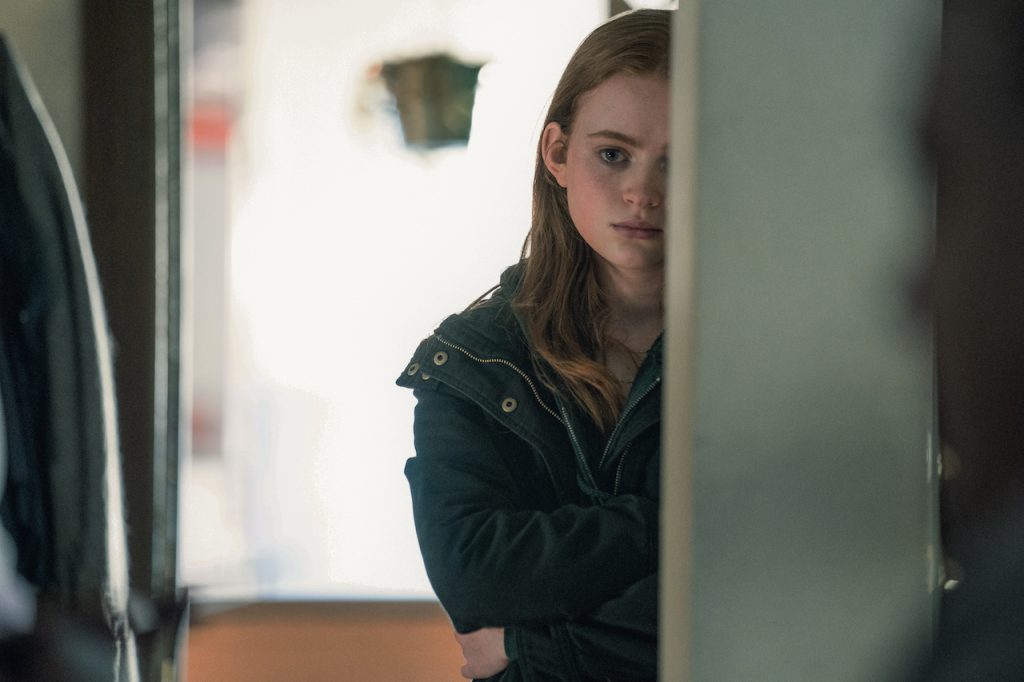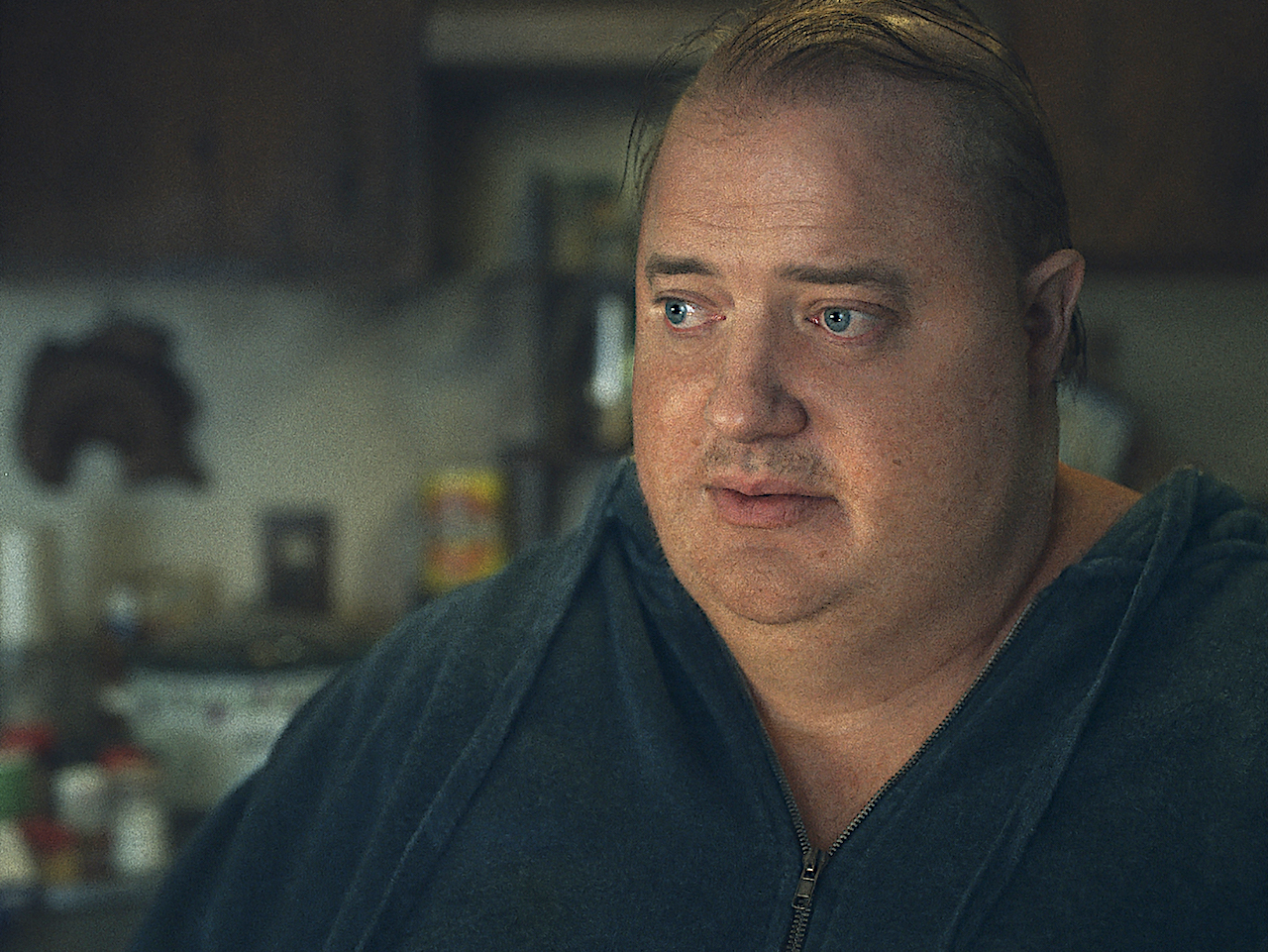The Whale represents more than a dry metaphor for Charlie’s (Brendan Fraser) morbid obesity in Samuel Hunter’s film of the same name adapted from his play. “I always knew Moby-Dick was going to be central to the story,” he said. “Something about Moby-Dick saved me when I was younger and closeted. I felt so close to these characters that were so far from me in time and space.” On another level, Hunter posed Charlie the fundamental question, “Is Charlie really seeing the goodness in Ellie [Charlie’s precocious daughter played by Sadie Sink] or are is he willing that into existence?” The dilemma is Charlie’s own white whale chasing the truth of his daughter versus his belief.
Moby-Dick is the essay that Ellie convinces Charlie to write for her in order to make amends. Although she barely passed, Charlie saw it as a win because she wrote from her heart not her mind. Ellie profoundly disagreed.
Samuel Hunter loosely based the story of The Whale on his own experience when he was brutally outed by a classmate and he self-medicated with overeating. “A lot of my plays starting with The Whale have a personal connection. I treated it as auto-fiction.” This stemmed from his lack of desire to be in the spotlight when he was very young, so he created an altar ego. “I never had the pull to write something that was truly autobiographical.” He concluded that adding these autobiographical elements to the story, namely that he is a gay person from the Mid West attending a fundamentalist church school, could only elevate the story. “I took these lived-in experiences and breathed them into a real work of fiction. It put something on the line for me emotionally. It took me to a more vulnerable place. But I kept a safe distance.”
From Play To Screen
Reconstructing a stage play into a film is an arduous task in terms of visualizing a story which almost exclusively takes place in one room. “I had to shift my perspective a little bit because I’m so used writing something for a field that’s populated with characters, almost as a piece of choreography.”
Film perspective is different in that “characters move where to tell them to move and see what you want them to see.”

Samuel D. Taylor
The adaptation process involved asking “where does this story want to live in this different medium?” Hunter cited the example of the second bedroom in the film that wasn’t in the play as an example. It was a shrine to Charlie’s partner Alan (whom we never meet) and an “archeology to Charlie’s time with him. It’s been untouched and preserved.” Hunter found the process liberating.
He could also write silent, private moments of living with Charlie as he’s going about his day that wouldn’t work on stage. “I didn’t want these moments to simply demonstrate behavior.” They had to reveal character. Every scene in the movie had to add up towards something. It couldn’t be unnecessary or arbitrary.” The writer cited the movie Who’s Afraid Of Virginia Woolf? as a movie with a similar contained scheme of story blossoming.
In spite of the weighty subject matter, Hunter believes that The Whale unfolds as a story of Charlie’s salvation. “It’s an apotheosis.” Charlie has certainly made bad life choices, and he seeks forgiveness. “Charlie is a man who finally becomes honest with himself and pledges to do more to regain faith in himself as a father.”
Charlie is a tower of strength in spite of his morbid obesity and estrangement from his family. “His biggest source of strength is his faith in other people. He’s chosen love and empathy over cynicism as his beacon.” He sees the best in people regardless of the barbs the hurl at him.
Do you ever get the feeling that people are incapable of not caring?
One-On-One Character Interactions
The Whale contains many two-person scenes mainly set in the main room of his house. “This illustrates that Charlie lives in many different worlds.” Charlie’s key interactions are with his daughter Ellie, a rage-fuelled teenager who struggles to forgive her father for abandoning her to be with his male lover. “Charlie’s trying to reteach her that she’s a kind and empathetic girl worthy of love.” Their constant sparring continues throughout the film, as Ellie resists him. Cracks appear in her heavy armour when Charlie reveals he’s been sending her and her mother Mary (Samantha Morton) money over the years. Mary and Charlie agreed that the money will be saved up and given to her on her eighteenth birthday. Rather than Ellie spitting venom at Charlie during this revelation, she responds that she’s hungry. She doesn’t thank him, but makes a snack. Charlie agrees to eat also. Ellie takes over the sandwich making duties. “Your sandwich is going to be small. It’ll only have turkey and no mayonnaise,” she insists in an uncharacteristically caring manoeuvre. Ellie becomes angry at herself because that’s not how angry teenagers behave, especially to the parent she’s rebelling against.
Mary (Charlie’s ex-wife) and Charlie share a touching moment when she listens to his chest when he wheezes from heart failure. It’s a touching moment when she relives a time of a man she once loved so dearly. “They were once a family in a happy marriage.” It was the first time the were together as a happy unit in almost nine years.
At that time, Charlie asks himself if he thought god turned his back on him because he loved Alan. “In a moment of brutal honesty, he says yes.” Charlie struggles with his faith throughout the entire film. It highlights the mortal constraints of boundless unwarranted faith. These moments are underscored when Thomas (Ty Simpkins), the naïve missionary who’s convinced himself he’s arrived to offer Charlie spiritual guidance knocks on Charlie’s door.
Liz (Hong Chau) is Charlie’s nurse and Alan’s sister. She spends considerable time trying to convince Charlie to visit the hospital to lower his blood pressure before he has a fatal cardiac arrest. There’s a key moment when Liz tears into Thomas by asserting that he’s of no help and she is the only one that can help Charlie. “I’m the only one that can help him,” she retorts. In addition to helping Charlie, this scene illustrates Liz’s co-dependance on him as her last remaining link to Alan.
We never meet Alan in the film, not even through a flashback. “Alan’s greatest impact on this story is his absence. It remains a gaping open wound in Charlie’s life. Alan’s absence is also a gaping hole for Liz,” said Taylor. Several years prior, Alan, Charlie and Liz were all harmoniously living in that house.

Ellie (Sadie Sink) Photo by Niko Tavernise
Charlie’s Got A Remote Job
Charlie works as an online expository writing instructor. Embarrassed by his weight, he falsely claiming that his laptop camera is broken so his students can only hear him. Samuel Hunter added that he was teaching the exact same subject while he was writing the play for The Whale. A memorable line of dialogue from his class is when a student concedes that their “life isn’t going to very exciting.” This was drawn from Hunter’s personal experience and approach to writing. Both Charlie and Samuel offer the same advice for their students, “Please write something honest.”
Hunter has his own views on how creative writing should be taught. Some schools insist on a rigid structure while other demand freeform. He agreed there was value in either strategy, but he felt like an imposter teaching them because he went home at night and wrote unstructured, experimental stories that were deeply personal to him.
By asking his students to write something intensely personal, Hunter witnessed the paradigm shift in their writing. “They move from writing the plays they think they should be writing to those they should be writing.” The act of writing should bring joy more than the act of having written something. “If you enjoy crafting stories, you’re going to have a great life. Everything else is going to be gravy. For me, writing is meditation… a purge, therapy,” declared Hunter.
There is a pivotal moment when Charlie turns on his laptop camera and unveils himself to his students. They stare in awe. “Charlie has finally gotten to a place of acceptance and self-love. It’s a gift he’s giving his students and a gift he’s giving himself. The students are reacting with their different prejudices, healings, instincts. They range from shock and surprise to ‘you look like my dad.’”
The Whale is a rich character study. Its sentimentality may have inadvertently let it slip into a soap opera or melodrama. But Samuel Hunter wouldn’t allow it. “It was important to me that there be a sense of humor although it went to difficult places.” Ultimately, Hunter called The Whale a dramedy. He felt that the story would be dishonest if it was entirely joyless. “Joy and despair and laughter and depression live next door to each other. It couldn’t be arch tragedy. It had to be human and real.”
Charlie’s fate is left open-ended at the film’s end. He may be the most fully-realized, joyful version of himself, but his heart may give way soon. Alternatively, he may face his imminent demise. “He has confronted his demons and given this final gift to his daughter. And in his final moments, he sees the final gift that he’s received.” He declared, “I need to know I did one thing right in my life.”
